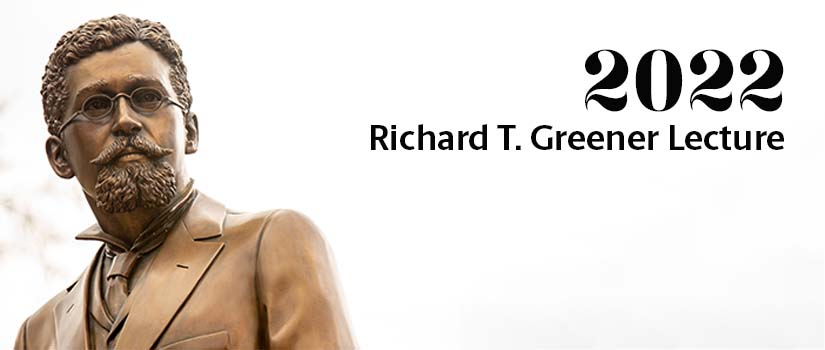The College of Education’s 2022 Richard T. Greener visiting lecturers are Marie Benedict and Victoria Christopher Murray, authors of The Personal Librarian. In their book, they share the story of Belle da Costa Greene, daughter of Richard T. Greener and librarian to J. P. Morgan. The lecture will be held at 6:30 p.m. on Sept. 8 at the Richland Library Main Branch. Murray and Benedict will be joined by the College of Information and Communications' Augusta Baker Endowed Chair and Associate Professor Nicole Cooke, who will moderate. The university community is also invited to join both authors for a book signing and conversation at 3:00 p.m. on Sept. 8 in the Hollings Special Collections Program Room. Register for the book signing.
Cooke is a member of the College of Information and Communications faculty. One or her key research interests is diversity and social justice in librarianship. The Personal Librarian provides an opportunity for the general public to be part of the dialogue around these issues.
Belle becomes one of the most important curators of art and literature in history, but had to give up her identity as a Black American woman to do so. Her legacy lives on in the hallowed walls of the Morgan Library and Museum and the collection she built is an invaluable resource to scholars and visitors today.
Benedict and Murray are honored to serve as this year’s lecturers and look forward to walking in Greener’s footsteps around our campus. While Greener’s character is only partially explored in the book, his time at the University of South Carolina shapes his family’s life forever.
“When Greener was at the university, there was a strong sense of hope, promise, equality and possibility for Greener and all Black citizens,” says Benedict. “The Civil Rights Act of 1875 had been enacted, and the world was their oyster. As he stepped into this role of first Black professor at the university, he was wearing so many hats. He served as a professor and librarian and worked tirelessly for civil rights. As the country changed around them, the promises changed as well and they left. The hope stayed with Greener forever, but their reality was cemented for his wife.”
The Greeners’ time in South Carolina ultimately helped ensure that Belle would have to pass as white to be successful in her career, a decision her mother made for their family. Greener would continue his work in Civil Rights and Belle became Belle da Costa Greene, losing her given name. Her sacrifices were many including giving up having a family of her own and the relationship with her father.
“There’s a focus on the positives Belle experienced in her career, but we wanted to emphasize the sacrifices she made from changing her identity,” says Benedict. “It took such a toll for her to live inauthentically in the world.”
The drive to represent Belle’s experience as accurately as possible is what brought Benedict and Murray together. Benedict sent Murray a proposal through her agent about collaborating. It ultimately led to a phone call, and the rest one might say is “historical fiction!”
“I always tease Marie that she buried the lead,” says Murray. “Once we had our first call, we haven’t stopped talking. It’s been the best part of my literary career. We knew from the beginning that there was something special about our relationship. We became sisters, and I didn’t know how much that was going to translate to our audience.”
Murray and Benedict hope their friendship inspires their audiences to engage in difficult conversations about race.
“Reading a book that’s fiction and having these conversations created a very safe place,” says Murray. “Questions you may feel uncomfortable about asking are easier when there is a character that you can base them on. This wasn’t our initial objective, but it’s become our goal now.”
“Writing this book was so transformative to me because Victoria trusted in me,” shares Benedict. “She shared her personal experiences and had very honest conversations that changed the way I look at the world. I read somewhere once that you can’t write about a character of a different background unless you love someone from that background – and I love Vic!”
Murray and Benedict are continuing their collaboration with another book and hope to further these conversations with their readers.
Richard T. Greener (1844-1922) was the first African American to serve on the faculty at the University of South Carolina (1873-1877). A statue was erected on the campus in his honor in 2018. The Greener Lecture honors and builds on his legacy and the contributions he made as professor, librarian, law student, and advocate for civil rights.
